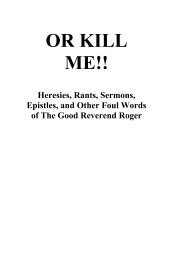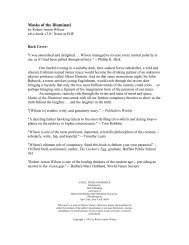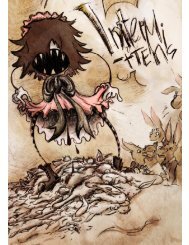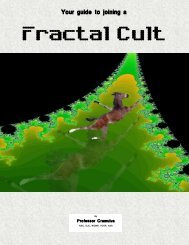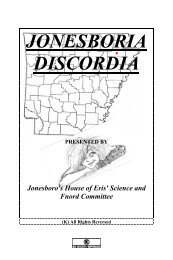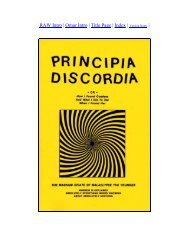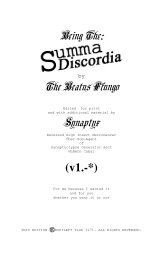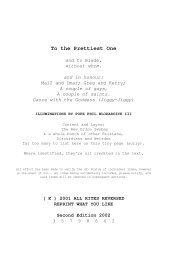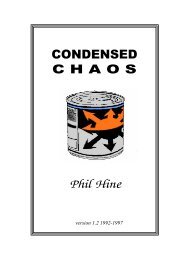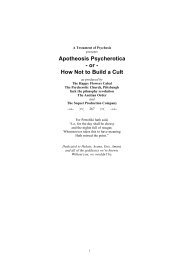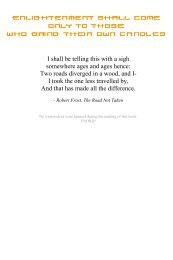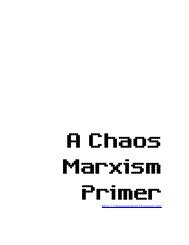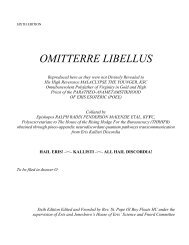Coincidance - Principia Discordia
Coincidance - Principia Discordia
Coincidance - Principia Discordia
Create successful ePaper yourself
Turn your PDF publications into a flip-book with our unique Google optimized e-Paper software.
178 COINCIDANCE<br />
could be President of Ireland anytime he wanted," I was recently told in a<br />
pub, "but his interests are more international now."<br />
Americans—even Irish-Americans—often find it impossible to understand<br />
Irish politics in the years when MacBride was an officer of the I.R.A.,<br />
1919-1937. Eamon DeValera {often called "the George Washington of<br />
Ireland") was, for instance, MacBride's superior officer in the I.R.A. in the<br />
early 1920s; the two were military enemies after DeValera entered the Free<br />
State government in 1927; they became political enemies after 1937, when<br />
MacBride, having become a lawyer, secured the release of hundreds of<br />
I.R.A. members and alleged I.R.A members imprisoned by DeValera.<br />
Today, MacBride speaks of DeValera with respect tinged with reverence.<br />
"Dev lost the civil war of 1922-27," he says, "but in the first five years he<br />
served as Taoiseach (Prime Minister) he won everything back that had been<br />
lost in the civil war." It was the accomplishments of those first five DeValera<br />
years 1932-37, that convinced MacBride that DeValera's nonviolent but<br />
constant pressure on England that led MacBride to resign from the<br />
paramilitary organization. When asked about some of DeValera's more<br />
intolerant policies, which were decidedly unfair to Protestants, MacBride<br />
says simply, "He was wrong then." When pressed for further comment, he<br />
repeats woodenly, "He was wrong, I said," and waits impatiently for the<br />
next question. Dev was wrong, his tone implies, but haven't all the rest of us been<br />
wrong sometimes?<br />
It was as Minister of External Affairs, 1948-51, that MacBride developed<br />
what has been dubbed his "sore thumb policy": any international tribunal on<br />
which he serves is sure to find that the question of the partition of Ireland<br />
has become part of the agenda, officially or otherwise—much to the<br />
embarrassment of the British delegates. And although separated from the<br />
old I.R.A. since 1937, and having denounced the terrorist tactics of the new,<br />
Provisional I.R.A. often, MacBride wrote an introduction to the autobiography<br />
of Bobby Sands, the Provisional who starved himself to death in protest<br />
against British occupation of the Six Counties, a non-violent tactic Gandhi<br />
would have approved. Although Margaret Thatcher denounced Sands after<br />
his death as a "man of violence," everywhere one travels in Ireland one sees<br />
graffiti, stark in their simplicity, saying only BOBBY SANDS R.I.P.<br />
Sean MacBride lives in Roebuck House, a rambling old Georgian mansion<br />
southwest of Dublin. Despite all 1 knew of his active life, I was astonished at<br />
the youthfulness of his complexion and the bouyancy of his walk. He<br />
dressed casually, as the Irish generally do, and looked mildly embarrassed<br />
when I said it was an honor to meet him. His secretary announced that,<br />
although I had been promised an hour and a half for the interview, the time<br />
would have to be cut to an hour due to another urgent appointment that



